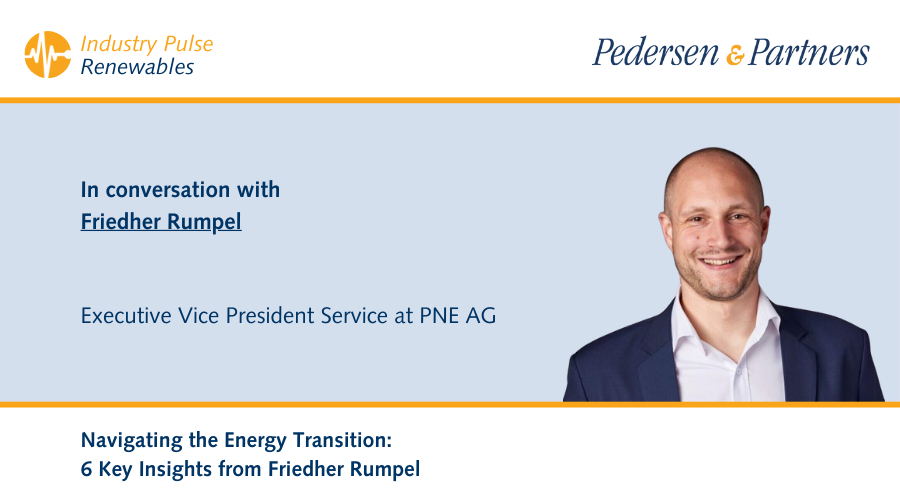Navigating the Energy Transition: 6 Key Insights from Friedher Rumpel
By Michael Larsen, Client Partner at Pedersen & Partners.
As the renewable energy sector continues to evolve, Friedher Rumpel, Executive Vice President Service at PNE AG, offers a comprehensive analysis of the industry’s current state and prospects, emphasizing the importance of stakeholder management and sustainable growth.
With a strong engineering background and extensive experience in the wind energy sector, Friedher provides a unique perspective on the industry.
As Executive Vice President Service, he oversees various services, including wind and site assessments, project construction management, and operations management. He outlines the life cycle of a project from planning and assessment to construction and operation, covering both technical and commercial aspects, such as grid connections, infrastructure, and maintenance.
PNE, a leading project developer in the renewable energy sector, specializes in wind and solar energy projects. Operating in 14 countries, with a significant focus on Germany, France, Poland, Canada, and Panama, PNE has developed substantial renewable energy assets and maintains a robust project pipeline. PNE has set ambitious financial targets, aiming to significantly increase EBITDA and expand their renewable energy portfolio. Friedher mentions the ongoing trends in electrification and ESG (Environmental, Social, and Governance) as important industry drivers. He also touches upon the evolving ecosystem, including integrating battery storage and hydrogen production.
Friedher reveals the challenges of project development, particularly the bureaucratic hurdles and securing permits, on top of the rising interest rates, political volatility, and competition. He highlights the need for electricity generation to stabilize revenue streams.
Key Insights and Observations
The Power of Strong Relationships: Friedher emphasizes the importance of nurturing strong relationships with stakeholders and investors. By fostering trust and transparent communication, PNE AG has been able to maintain investor confidence, secure new partnerships, and sustain its growth trajectory.
Leveraging Technological Innovation: PNE's dedication to adopting advanced technologies has established it as a leader in the renewable energy field. Rumpel explains how innovation fuels operational excellence and competitive offerings.
Adapting to Market Dynamics: Friedher shares insights into how PNE remains agile and responsive to changing market dynamics. For example, PNE’s strategy of combining project development with electricity generation to stabilize revenues is a noteworthy approach to managing sector volatility.
Risk Management Strategies: Friedher highlighted PNE's comprehensive risk management framework, which included meticulous project planning, diversification of energy sources, and financial hedging. These strategies minimized exposure to market volatility and project-specific risks, bolstering PNE's resilience in an unpredictable sector.
Community Engagement and Social Responsibility: PNE actively engaged with local players where projects were developed. Friedher explained how PNE’s initiatives aimed at fostering positive relationships and ensuring that people’s concerns were addressed. This engagement not only facilitated the acceptance of projects but also reinforced PNE’s reputation as a socially responsible company.
Cultivating Talent for Future Success: According to Friedher, PNE AG prioritizes human capital development, ensuring that its workforce is equipped to drive the company's innovation and growth. He emphasized PNE's commitment to invest in training programs and knowledge-sharing initiatives, to ensure that its workforce stays at the forefront of industry developments. This culture of continuous learning enabled PNE to implement best practices and maintain its competitive edge.
Friedher offered a comprehensive overview of the renewable energy sector's operational challenges and strategic initiatives driving PNE’s growth. As the industry continues to evolve, PNE’s approach to integrating sustainability, technological innovation, and stakeholder engagement - positions them as a key player in the energy transition.

